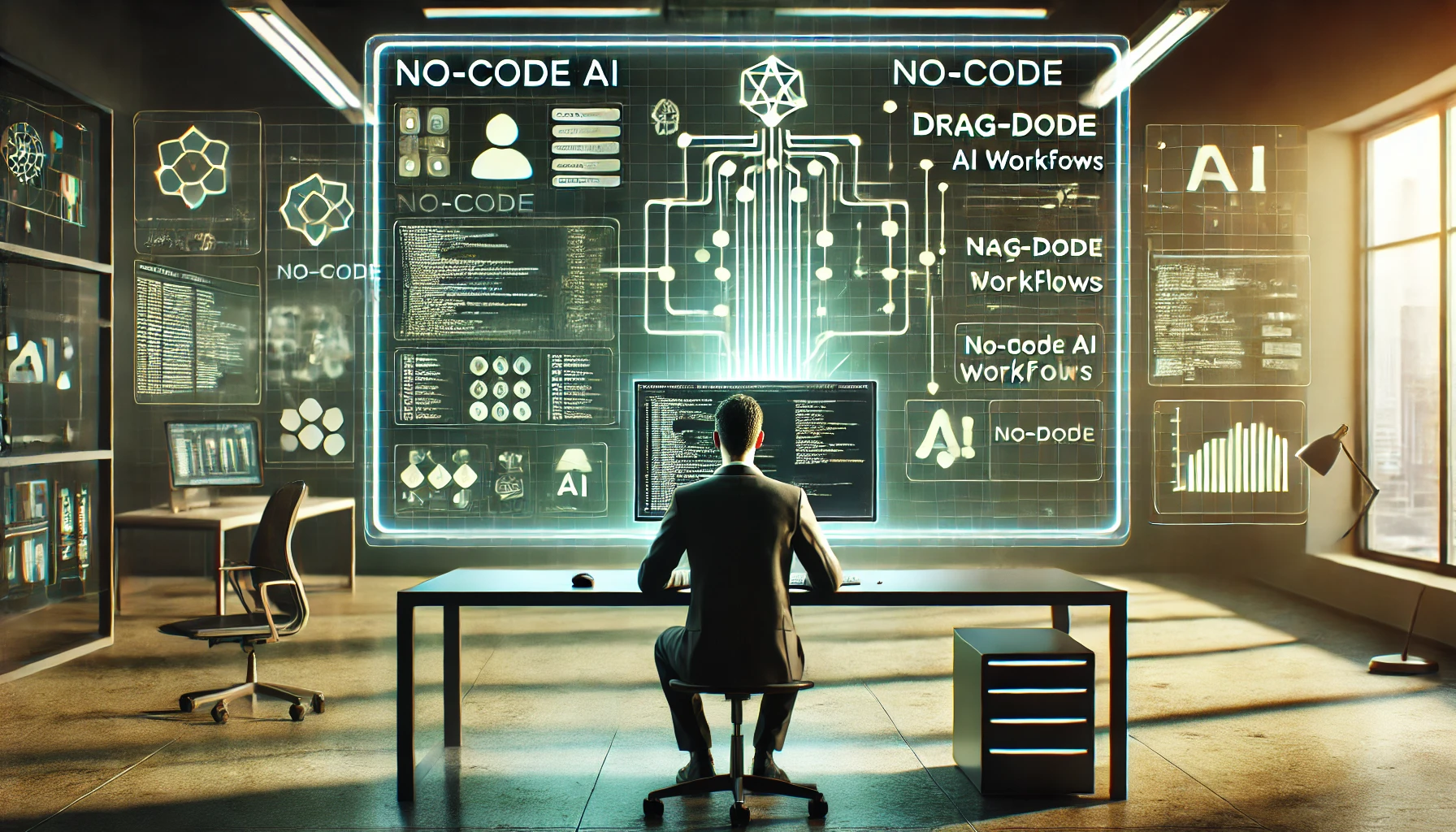The future is finally here, and it’s showing up unannounced, holding an AI-generated invitation we never knew we RSVP’d for. Get ready, because the concept of a “Post-Labour Society” isn’t just a theory anymore—it’s becoming our new reality, and it doesn’t need you to clock in at 9 AM.
By Ing. Benno Pieters DMS MBA using ChatGPT 4.O
Imagine a world where jobs, the backbone of civilisation and morning misery, are taken over by tireless, drama-free AI. No more coffee breaks, no passive-aggressive notes in the office kitchen, and certainly no spreadsheets that care if you stayed up too late watching another dystopian series.
Experts—those wise folks we look to for answers while secretly Googling the same things—say our economic system needs a major update. This outdated model was made for a world where people worked, produced, and then retired to stare at their garden. But we’re shifting gears. The future’s economy, they say, should be designed not to make people work, but to let them truly live—with the help of Artificial Intelligence.
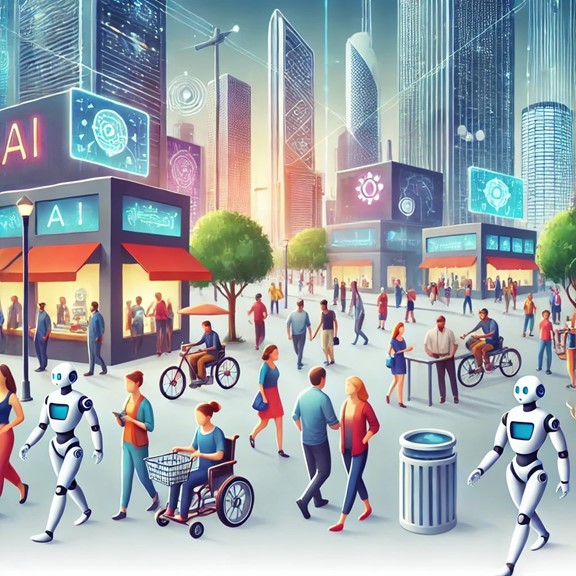
Sounds great, right? But of course, there’s a catch: the traditional idea of success is built on earning your living through hard work—though, nowadays, it’s more about typing than physical labour. A post-labour economy challenges that familiar story, replacing the sweat of your brow (or fingertips) with technology-fuelled abundance.
This is where things get interesting—or terrifying, depending on your comfort with change. Instead of work being necessary for survival, we’re moving into a world where economic freedom—a fancy term for “feeling in control of your life and finances”—is no longer tied to having a job. Radical, right? The truth is, this kind of freedom excites some people and scares others—often at the same time, depending on their caffeine levels.
In the coming post-labour society, decentralised systems are the new buzz. Forget centralised banks and Wall Street tycoons in suits whose job descriptions are a mystery. We’re talking tokenomics: making the entire economy more like tradable baseball cards—but this time, it’s businesses, ideas, and AI-generated productivity being tokenised. A bakery in your neighbourhood? Tokenised. Your favourite local bookshop? Tokenised. And that’s not all—with autonomous systems running governance and AI making trade decisions, there’s potential for a transparent, fairer system.
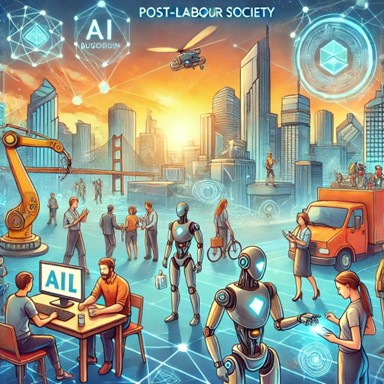
Let’s put some of these ideas into real-world examples. Picture a small neighbourhood bakery. In the old economic model, the bakery’s growth depended on bank loans, market conditions, and hard work. In a tokenised, post-labour society, the bakery could be funded by the community, using blockchain to sell tokens representing a share of future profits. Locals could invest in the bakery, becoming stakeholders. Not only does this distribute wealth locally, but it also incentivises the community to support their local businesses—because, after all, they’re part owners.
Now, we get it—”tokenising productivity” and “AI-powered governance” sound like sci-fi concepts. But think about this: what if, instead of waiting for bureaucracy to help, communities started owning their local resources directly, connected by transparent AI systems? Imagine an entire neighbourhood that owns its solar energy production. AI manages the distribution, ensures efficiency, and everyone gets a share of the profits. No politicians arguing over paperwork, no corporate gatekeepers keeping the benefits—just efficient, direct flows of value. It’s like putting your community on autopilot, but without the bad in-flight movie.
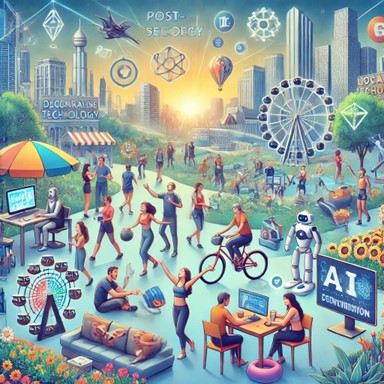
And here’s a twist on Universal Basic Income (UBI): experts are proposing something called Universal High Income (UHI). Imagine, instead of scraping by on government handouts, people could use tokenised AI productivity to earn a substantial income—investing and growing their wealth. Instead of governments handing out money, people could have control. They could invest, participate, and shape their financial future without some bureaucrat reminding them they’re lucky to have it.
Consider a freelance graphic designer in this post-labour world. Instead of searching for clients, bidding on projects, and dealing with late payments, they could tokenise their skills. Companies or individuals needing design work could purchase tokens, effectively pre-paying for their services. The designer receives income upfront, and token holders have access to future work. AI platforms would handle contracts, scheduling, and payments—removing the need for stressful negotiations and letting designers focus on their creative work.
Current Technologies That Make This Possible:
So, how will we make this work? Thankfully, we already have some of the technologies we need:
- Artificial Intelligence (AI): AI-driven automation is already here, taking over repetitive and mundane tasks in various industries—from customer service chatbots to AI-assisted manufacturing. These systems are getting more efficient by the day, and this trend will only continue. Take, for example, Amazon warehouses where AI and robots work seamlessly to manage inventory, making processes quicker and reducing the need for human intervention.

- Blockchain and Tokenisation: Blockchain technology allows for the secure tokenisation of assets, which can be applied to almost anything—from local businesses to community resources. Tokenisation gives people the ability to own a piece of productivity, enabling decentralised economic participation. A good example is artist communities that use NFTs (Non-Fungible Tokens) to monetise their work, allowing them to bypass traditional art dealers.
- Decentralised Autonomous Organisations (DAOs): DAOs are already being used to make governance transparent and decentralised. Communities and businesses can manage themselves without the need for traditional hierarchical structures, allowing for more direct and democratic decision-making. For instance, the cryptocurrency community MakerDAO is run by its members, who vote on key decisions about the platform’s future.
- Robotic Process Automation (RPA): RPA is already being used to handle administrative tasks, freeing up human workers for more meaningful roles. In a post-labour society, RPA will continue to play a crucial role in taking over routine work. Banks are using RPA to manage customer onboarding processes, reducing paperwork and improving efficiency.
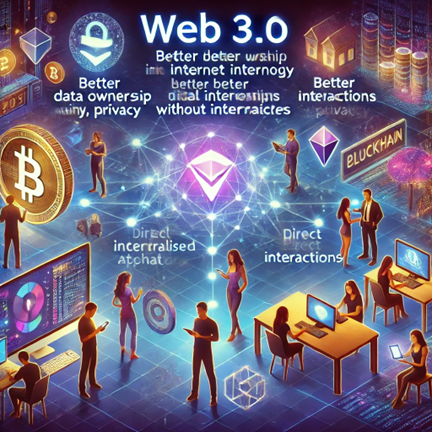
- Web 3.0: Web 3.0 technologies are enabling more decentralised internet experiences, providing individuals with better data ownership, privacy, and the ability to directly interact in digital economies without intermediaries. Web 3.0 is expected to become fully productive by 2027, allowing for seamless integration of decentralised platforms into everyday life. Imagine social media platforms where users control their data and earn tokens for the content they create.
New Technologies Needed:
- Advanced General Intelligence (AGI): We will need more advanced forms of AI that can handle complex decision-making on par with or better than human abilities. Developing AGI is a significant challenge, but estimates suggest it could be here by 2028 or 2029. This would be a major step forward in enabling a true post-labour economy. For instance, AGI could manage an entire city’s infrastructure—transport, energy, waste management—optimising resources and reducing human oversight.
- Efficient AI Governance Systems: Autonomous AI systems that can govern local resources effectively and transparently are still in development. These systems will require breakthroughs in machine ethics and decision-making to ensure they act in the best interests of communities. With AGI available by 2028, efficient AI governance systems could be in place around 5 years later, by 2033 or 2034. Imagine a local council that is run entirely by AI, making unbiased decisions based on data, rather than political agendas.
- Universal Tokenisation Platforms: While blockchain technology exists, we need more robust and scalable platforms that can handle the tokenisation of all kinds of assets in a secure and efficient way. With the progress expected in AI and blockchain, we could see universal tokenised platforms by 2033 or 2034, once scalability, security, and regulatory issues are resolved. Imagine owning a fraction of your favourite café or even a piece of local infrastructure like a park, with dividends paid back to you for its use.
So, are you ready to clock out and start living? To let AI handle the boring stuff while you explore your passions? Sure, there’s still a lot to figure out—like inequality, ethics, and finding a new sense of purpose. But the technology is here, and with it, the potential to reimagine life as more than a series of shifts, deadlines, and balance sheets.
For now, our role is to lay the groundwork, run experiments, and explore how local communities can embrace a new kind of economic independence. It’s about grabbing a seat at the table, not because we have to, but because we want to—and because this new future, while challenging, sounds like it might actually be worth sticking around for.

Here’s to a post-labour society: freedom through technology—and maybe even the chance to finally get your mornings back.
And remember – AGI lets us focus on what matters: freedom for creativity, exploration, meaningful connections



